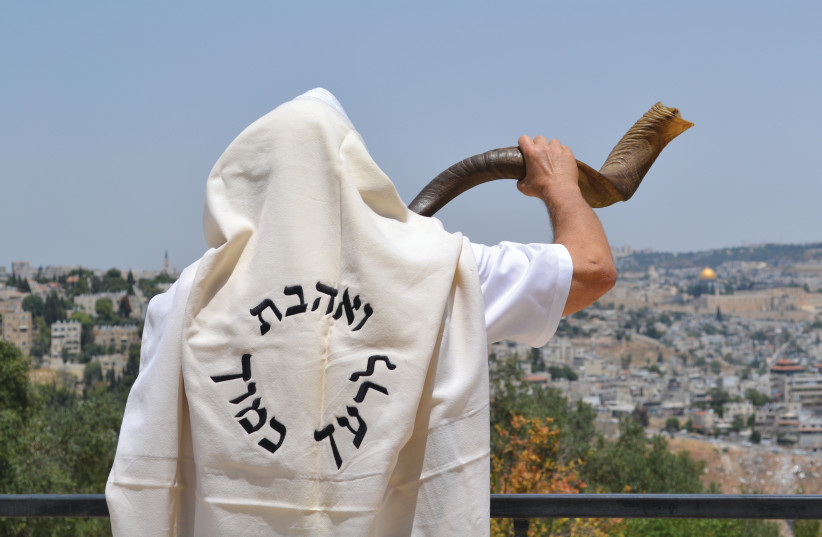I can’t believe Rosh Hashanah is in a few days. Where did the summer go?
As long-time readers are aware, among all the many symbols that highlight Rosh Hashanah, for me it’s all about honey cake. Yes, I like honey cake but in my family the problem is that I am the only one. Everyone else thinks it’s “gross.”
Thankfully, earlier in the week I got a message from a close family friend that an extra honey cake was made specifically for me!
Why is Rosh Hashanah the Day of Judgment?
Food symbols notwithstanding, one of the central aspects of Rosh Hashanah is that it’s the Day of Judgment. The question that needs to be asked is why is it the Day of Judgment? After all, the Torah doesn’t refer to it this way.
Rabbi Eliyahu Kitov z”l writes: “‘Rosh Hashanah is the Day of Judgment for all of mankind. On this day man is judged for all of his actions, and all that will transpire and occur during the coming year is recorded.’ The Talmud (Rosh Hashanah 8a) derives this from the verse (Deuteronomy 11:12) that states: The eyes of God, your Lord, are upon it [the land] from the beginning of the year until the end of the year – i.e., from Rosh Hashanah, the world is judged as to what will transpire throughout the year.

“Our sages said: On Rosh Hashanah, all of mankind pass before Him like sheep – they pass by Him one by one, one after the other, yet He scrutinizes them all with a single glance.
“Thus, the verse (Psalms 33:15) states: ‘He created all of their hearts together and understands all of their actions.’ God, Who is the Creator, sees all of their hearts together (with a single glance) and understands all of their actions.”
<br>Not just spiritual
It’s not just Judgment Day for life and death but for financial matters as well.
The Talmud discusses this in a few places. R. Tahlifa, the brother of Rabinai of [Be] Hozae learnt: The entire sustenance of man [for the year] is fixed for him from New Year’s [festival] to the Day of Atonement, except the expenditure for Sabbaths and the expenditure for festivals and the expenditure for the instruction of his children in the Law; if he [spent] less [for any of these] he is given less and if he [spent] more he is given more.”
Tractate Beitza 16a: “R. Judah, son of R. Shalom, preached as follows: In the same way as a man’s earnings are determined for him from New Year, so his losses are determined for him from New Year.”
Tractate Baba Batra 10a: “The fact that we are judged as to our financial situation brings with it our own responsibility to live within our means.”
The Mishna Berura writes: “The Gemara states that a person’s income is determined on Rosh Hashanah. Rashi explains: And he must be cautious not to spend excessively because he will only be given what was fixed for him. This is a great moral lesson for our generation, because due to our great sins, many people violate Rashi’s comments and don’t pay attention to their expenditures and don’t avoid excessive spending. There have been many victims of this terrible practice that eventually brings people to theft and corruption and to great embarrassment.” (Mishna Berurah, Bi’ur Halacha 529:1)
Much to my chagrin many people only focus on the spiritual side of this time of the year, but it appears that there is good reason to get back to basics financially as well. The first step is to make a budget. When you know what you are actually earning and what your expenses are, you’ll probably be surprised to find that there could be something left at the end of the month.
When creating a budget, make sure that it is realistic, matches your lifestyle and that it leaves plenty of room for extra expenses that seem to pop up regularly (like a broken fridge or dental work). Add a monthly savings goal to the budget.
Although nobody said it’s easy saving on an Israeli salary, as with most things in life, it can be accomplished with hard work. You don’t need to buy everything. Whenever you are about to buy something stop and think if it’s something needed or something that you just want to have. If it’s just a want, say no and don’t buy it. Much of what we buy are “want’s” and not “needs.”
Just because your neighbor decides to make a large purchase or take the family away to a 5-star hotel for all of Sukkot, doesn’t mean that you need to do the same thing if you can’t afford it. While there is nothing wrong with spending your hard-earned money, it just needs to be done in a responsible manner.
<br>Now is the time
After budgeting and starting to save, it’s time to start investing, to start on your path to a secure financial future. The most important advice is just to start. Start small. When it comes to doing teshuvah (repentance), we are not expected to become perfect individuals overnight, and we need to start small and work day by day to improve ourselves spiritually.
The same idea applies to our finances. You don’t have to wait until you have $250,000 to start. If you have $20-30,000 sitting around in the bank, start investing and getting your finances in order.
May we all merit a happy and healthy and honey cake-filled New Year. Ketivah v’chatimah tovah.
The information contained in this article reflects the opinion of the author and not necessarily the opinion of Portfolio Resources Group, Inc. or its affiliates.
Aaron Katsman is the author of Retirement GPS: How to Navigate Your Way to A Secure Financial Future with Global Investing. www.gpsinvestor.com; aaron@lighthousecapital.co.il.
